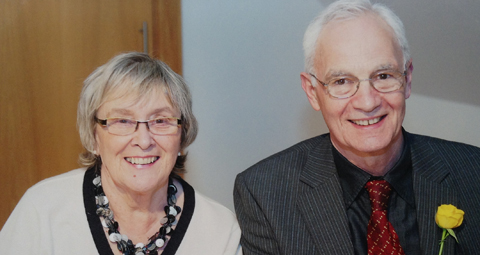October 14 | ![]() 0 COMMENTS
0 COMMENTS ![]() print
print

DEMENTIA MY LIFE AS A CARER
In a special report, MICHAEL TURNBULL speaks about the challenges of caring for his wife Mary, and gives some advice we can all follow to help those with dementia
ONE immediate affect of a dementia diagnosis is that nearly all of the friends of the person with dementia simply disappear, partly because they don’t know how to deal with the change in their friend’s appearance or with their new fragility.
Life for a dementia family carer is also turned upside-down.
That is my experience, as I always relied on Mary, my wife, for her social networking skills, her wide circle of friends and her ability to judge character.
Now the boot is on the other foot and I have to be the strong one.
As well as having spent more than 30 years as a teacher in Catholic schools, she worked tirelessly as a catechist, in sacramental preparation, marriage preparation, RCIA and as a church organist and choir leader.
Late in her career, supported by her parish priest, she gained a master’s degree in Pastoral Ministry through the LIMEX programme. All those skills have now gone, although she is still able to play the piano and sing!
Her life is full—with attendance at a very good local day centre, aquarobics classes, attending a personal trainer, music therapy, art therapy and international air travel.
There is no time to waste, as you don’t know how much quality time you and your loved one may have left together.
How did this all come about? There are recent research studies which seem to show that, while genes play a part, human brains can be damaged by metal fragments from exhaust fumes.
It is still possible to drive a car with dementia, but the DVLA requires regular driving tests to make sure that the person concerned is not a danger to others on the road. In my case, my wife continued to drive safely and well, and passed the DVLA tests, but eventually had to give up after she burnt out two clutches, as she intermittently forgot how to change gear.
How does the NHS deal with dementia? After the GP refers someone to a Memory Clinic, a tentative diagnosis results and this is followed by advice to the family carer to set up a full Finance and Welfare mutual power of attorney (POA) and to notify the DVLA. Happily, dementia is not a natural consequence of ageing, as the existence of early-onset dementia proves.
At first I was able to continue working part-time but this became more and more difficult as Mary required greater levels of daily care and, due to critical and ongoing shortages of staff in most care companies, I was unable to set up reliable cover to allow me hold down a job with confidence.
Care companies in Scotland consistently suffer from acute shortages of staff, which critically reduces their ability to fulfil the care contracts, partly from low levels of pay but also from an inability to retain and motivate staff and the often too prevalent practice of imposing excess overtime working.
As well as shrinking lifestyle opportunities for family carers, degenerative diseases demand greater and greater commitment, which sets up a conflict between the carer’s enjoyment of work and leisure pursuits and the carer’s sense of responsibility to the person with dementia.
Although family carers are strongly advised to take time off for themselves and are provided with some funding to do this through a carer’s assessment for respite care for the sufferer, it goes against the grain to holiday alone without the company of a spouse.
In the 21st century, extended families seldom live in close geographical proximity and the prevalence of the nuclear family with husband and wife living on their own, means that most of the responsibility falls to the family carer. If there are children they tend to live hundreds of miles away and if there are siblings the same applies.
The temptation for all is to put our heads in the sand and pretend that dementia isn’t happening. For the family carer the Memory Clinic diagnosis is accompanied by hints of dark times ahead.
Opportunities for enjoyment together of activities which once gave mutual satisfaction slowly diminish, as aphasia may set in where language begins to disintegrate, even with the support of community psychiatric nurses and speech and language therapists.
Then the day comes when, out of the blue, nurses and therapists suddenly tell you that the person with dementia is ‘discharged!’
Unexpectedly a door is opened onto a featureless landscape where there are no road signs to guide you on the way forward, although you are told that you can be re-admitted if there is a significant change in the person with dementia’s condition.
Fortunately, there are agencies in this wilderness who exist solely to support carers and those with dementia in this bewildering situation. They can help negotiate the complexities of government legislation for local authority social work provision and advise the increasingly isolated carer how to find a positive way forward. The best advice we received was to see that the person with dementia had ‘interaction’—in other words, meeting people, going for walks or swimming to promote mobility, enjoying a full active life in which day centres play an increasing part.
They offer a safe environment with lunch, games, singing and dancing and, in the best cases, bus day trips. However, day centres, which charge only nominal fees, freely admit that they exist primarily to give the carer time off in order to return refreshed to the caring role.
Caring for those with Alzheimer’s and dementia tends inevitably to take over the carer’s life. These degenerative diseases can take hold as much as 20 years before anyone first notices them. Families then first see the arrival of changes in a loved one’s personality or behaviour and it gradually becomes clear that habitual activities, opinions or reactions have changed from their usual pattern.
Once such changes become unmistakable through, for example, misjudgements in using money, or difficulties with mechanical everyday routines such as changing gear in a car or putting on a washing machine, then the first essential step is to make an appointment with the family doctor. It is the GP, in consultation with the family, who then takes the decision to refer a person to the local Memory Clinic for assessment and diagnosis.
It is important for families to do this as soon as possible after the first signs of confusion appear. The key to effective dementia treatment is to take action early in order to set up a care plan to manage the physical or psychological changes that have been emerging.
The family doctor notifies the social work department, which then carries out an assessment of the needs of the person. If there is a family carer they can themselves apply for an assessment which will provide some funds for respite care to help get time off, which is important if the carer is to avoid ‘burn-out.’
What contribution can the Catholic Church in Scotland make towards the care of people who have degenerative diseases such as Alzheimer’s and dementia, but who are still healthy and mobile enough to be able to live in a home environment with the help of family carers?
John Swinton, a charismatic professor of practical theology and pastoral care at the University of Aberdeen, hits the nail on the head when he writes in Dementia, Living In The Memories Of God (2012) that ‘the key is to create places of belonging where people with dementia and those who offer care and support to them can find a place that is truly theirs and within which they can express the full experience of dementia—its pain, its affliction, and its lament as well as its joys and possibilities.’
Swinton suggests that we should adopt a ‘theology of visitation,’ an outreach programme that fits well with a recent initiative of the St Vincent de Paul Society in Staffordshire to set up a volunteer group, with the support of parish priests and health visitors, called Dementia Companions, which has spread through England and is now beginning to establish itself in Scotland through the SSVP.
Members are trained by the Alzheimer’s Society and dementia specialist community nurses, as well as using e-learning resources.
An online booklet, Growing Dementia-Friendly Churches (Methodist Homes, 2004), offers this practical advice on how to structure church services: “Creating a dementia-friendly church is about delivering a style of worship service which those who have dementia can engage with, and even take part in.
“This means taking account of low concentration spans, short-term memory loss and any difficulty in processing verbal communication that is too wordy or too long.”
From the United Methodists in Nashville, Tennessee, comes a suggestion for quick ideas to become a more dementia-friendly church: you could organise care-givers’ support groups, set up a monthly respite time for carer-givers, and offer a regular special worship service for members with dementia.
You could also explore talents and abilities in people with dementia that they can share with others in the church, train members and church leaders in dementia awareness, and provide a Memory Cafe where the memory-impaired and their care-givers can get together.
You could develop a prayer-chain for the families and caregivers to minister to their mental, emotional, and spiritual well-being.
While dementia and Alzheimer’s may seem to be a gradual death of someone’s personality and their memory, John Swinton reminds us that ‘one profound way in which God remembers us is by being present with us.’
Provocatively, he asks ‘whether the act of welcoming people with dementia and their families has been central to the strategies of mission, evangelism, worship and pastoral care that they have encountered?’










